In the endless sea of JRPG titles, the Atelier series is one that often goes underappreciated, which, in my opinion, is a shame. I am sure that upon first glance at any title in the series, the fanservice, which has always been a lot of it, can either suck a player in or send them packing. Atelier Ryza is arguably more so, given that producer Junzo Hosoi even addressed certain dummy thicc design choices as owing to the lost decades following the Japanese economic bubble bursting, circa 1990.
I feel like I needed to be there to get it. What I do know, though, is that first appearances can be misleading, and in this case, they can prevent you from having one of the best experiences in the genre, and one that consistently feels unique rather than another game saying or doing the same things. And, the best part is that, in total, you are spending more than an average-priced game. With the Atelier Ryza DX Trilogy, you are getting three games that are the pinnacle of the series, loaded to the brim with content for far less than the time you will spend lost in exploration.
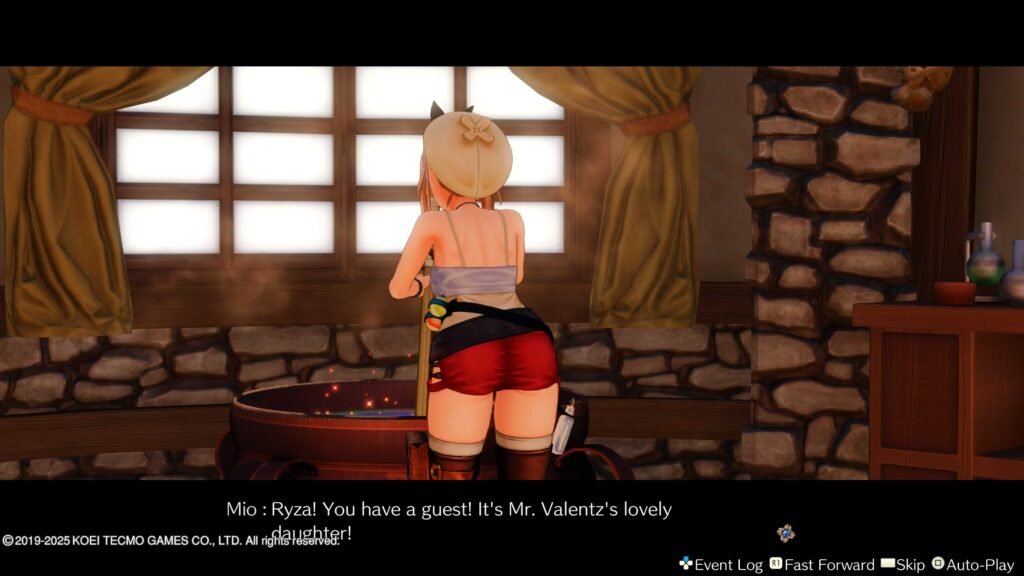
An Atelier, for those that may not know, since it is such a fancy word, is defined as a workshop or studio, and these usually come into play a lot in the franchise. It is easy to get confused by the term, given that the game’s focus emphasizes the use of alchemy, with the workshop serving as a home base where she creates them. There is an important notion here, with the game’s heavy focus on slice-of-life elements rather than forcing the player straight into fighting dragons. You will eventually fight dragons, but that isn’t the typical RPG tropes that don’t play a factor right away, especially in the first game.
Ryza, when we are introduced to her, is a troublemaker, and much of the early act plays into her desire to become an alchemist, which comes with her journey to even learn the basics. All of this is set in and around the town she has grown up in, meaning that, despite how far the player might traverse, the narrative is about a young girl changing her town for the better, never anything as grand as saving her world. It’s all more meaningful, though, with much of the narrative being a character portrayal of not just Ryza but of her friends and allies.
Despite this, the game does have a problem with just how slow it takes to open up, with the first game in particular taking me 10-15 hours before exploration became fully meaningful. This isn’t to say that the game locks you into some linear adventure; the game actually opens up its wide areas shortly into the story, save for barriers to areas you cannot reach till later. The issue is that the game very quickly gives you access to a lump some of alchemy recipes to craft, then checks progress, but does not allow you to access the ingredients that are required until you progress further. It’s a frustrating feeling to visual see all these great abilities you can’t actually engage with.
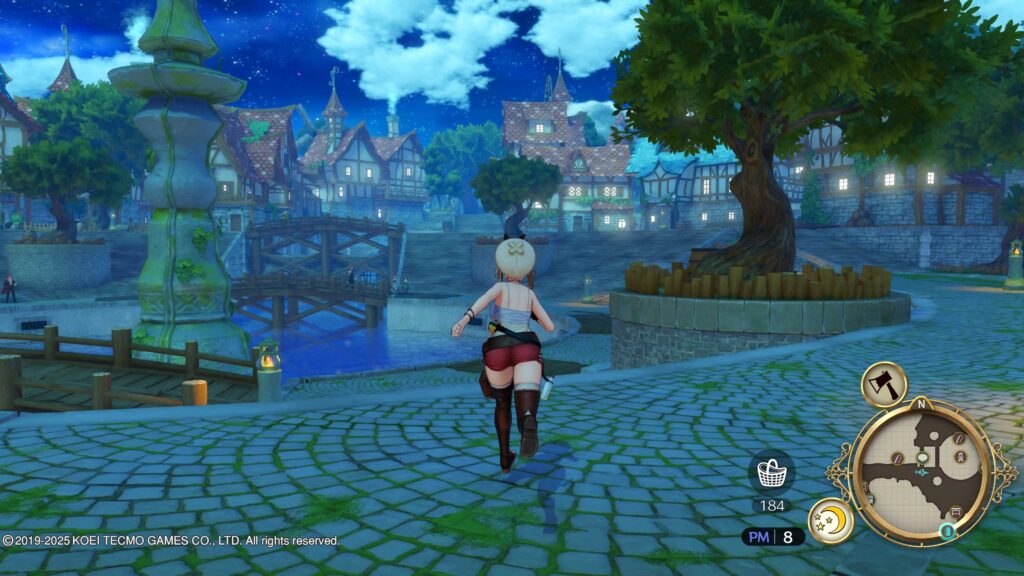
What’s worse is that the games don’t tell you where the ingredients are; you might actually delay your progress, thinking you are locked behind access. One example of this was a mission that required me to find lumber, which is easy to find, as trees are everywhere, but you need an axe for lumber and lumber to create the axe. Kinda a catch 22. What the game doesn’t tell you is that boxes containing the wood are located around. I didn’t realize this, so I ended up without the means to craft this tool, which held me back from a lot of good crafts because I didn’t figure this out.
It’s an important loop to the game as well. I just kept missing the box. As Ryza heads out of the base, she can pretty much destroy everything. Provided she has the means to do so, she is to use it in her alchemic endeavors. Some even allow for multitudes, depending on the tool. A tree, for instance, can be knocked with a staff to drop fruit, a sickle to cut off its bark, and an axe to get the lumber mentioned above. One of the improvements made to Atelier Ryza DX is that her basket, which she uses to store materials, has been expanded slightly.
I would argue it doesn’t go far enough. Half the game is ignoring enemies to whack everything you can with anything you can, so you will run out of space quickly. I’ll be fair, I don’t remember the original games enough to say how much it is extended, but it does feel like I have taken fewer frequent trips to my hideout. Based on the size in-game, it appears to be about the size of the fully upgraded version in the original game, prior to even being upgraded, so yeah, it’s a big step up. And all three games get this benefit.
One of the reasons I always recommend Atelier Ryza, even prior to this, is its alchemy, which was much easier for me to learn than the previous trilogy, and it remains consistent between the games with some minor changes. Basically, the best part about this trilogy is that each is easily accessible, but then it builds upon the predecessor to make it flow better. Most of these changes are subtle, almost eye-rolling when you realize and proclaim, ‘this is so much smoother’. The drawback is, especially if you just bought this collection as your introduction, that playing in order is almost mandatory because backtracking can be frustrating when you need to re-adjust. The alchemy feels great, and you get instant, fun results. This is needed, though, just because of how much runs through alchemy.
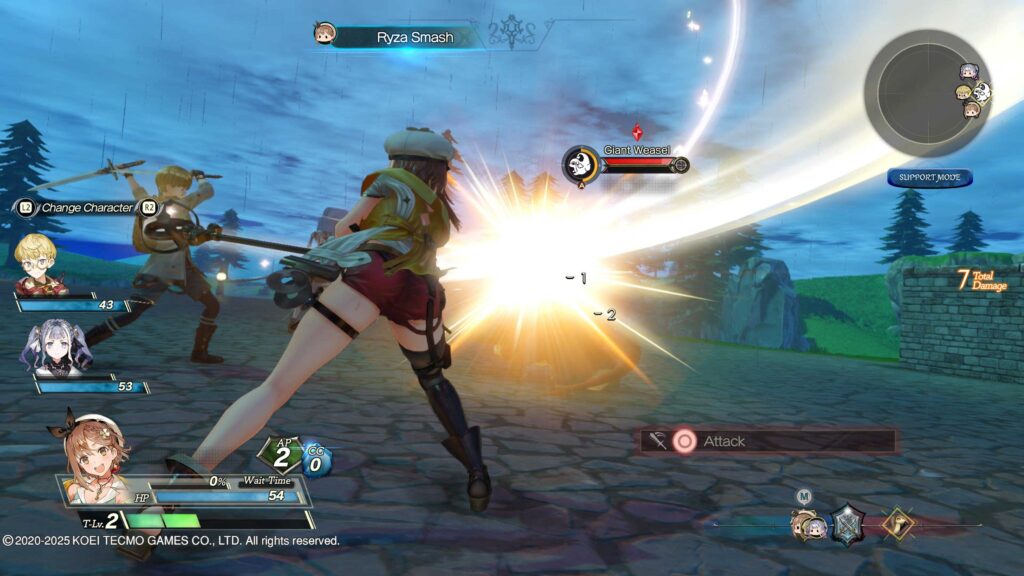
You can get currency like any other JRPG, but crafting items and, more importantly, duplicates, are the best way to bring in profit and complete almost any other sidequest in the game. In fairness, the series can struggle when the diversity of missions is ‘Hey Ryza, can you make us some ointment’ all the way through to ‘Hey Ryza, can you make us an axe?’ Crafting stuff is fun, though, and progress is always rewarded with being able to take an already deep mechanic further, such as upgrading already crafted tools, and continuing to build upon everything and keep a great mechanic from getting stale. Of course, in all of the games, these too can take a long time to materialize.
This being said, the game has a lot of great narrative that does make up for the slowest elements. Even when you are stuck on crafting something, which halts the main story’s progress, little cutscenes that flesh out the characters can play for almost no reason. Returning to base just to drop off supplies can be met with learning more about the relationships between Ryza, Lent, or Tao. Or, a character like Klaudia can show up to showcase her musical talents. These moments are bite-sized but always showcase that there is something happening. At worst, they remind you how long it takes to expand your party beyond just the initial three cast members.
In the case of the third game, which expands the largest cast the series has ever seen by three members, that payoff can be a lengthy and arduous journey, and with this being a life of life game in regards to progression, the kicker is constant interactions with some characters till they can finally ‘join’ you. On the bright side, each progressive game takes less and less time to open itself up to you, so at least you have options early on, but the Atelier series has always had to problem of saddling you with a set party till you cross the threshold of commitment, rather than rewarding you with a wider cast to help you want to pass it.
The narrative of the game is punctuated with great voice performances, even if they teeter into that of over-the-top anime territory. Even if Ryza can have high energy and a high-pitched voice, her dialogue never felt out of sync with the performance itself, and the character at least commits to it. As the narrative across the three games progresses, always feeling closed, then opened again with purpose, every character and their performances do depict the growth these characters have over this 4-year period, with Lent and Tao, Ryza’s closest friends, having engaging arcs that feel planned even from the first moment. Bos, the town bully in the first Atelier Ryza, also has beats and moments you often don’t get with these games, when the arc cuts off after saving the world from the imposing god monster. And here you get 3 narratives, complete with (At least for me) 100 hours a piece of story to consume you.
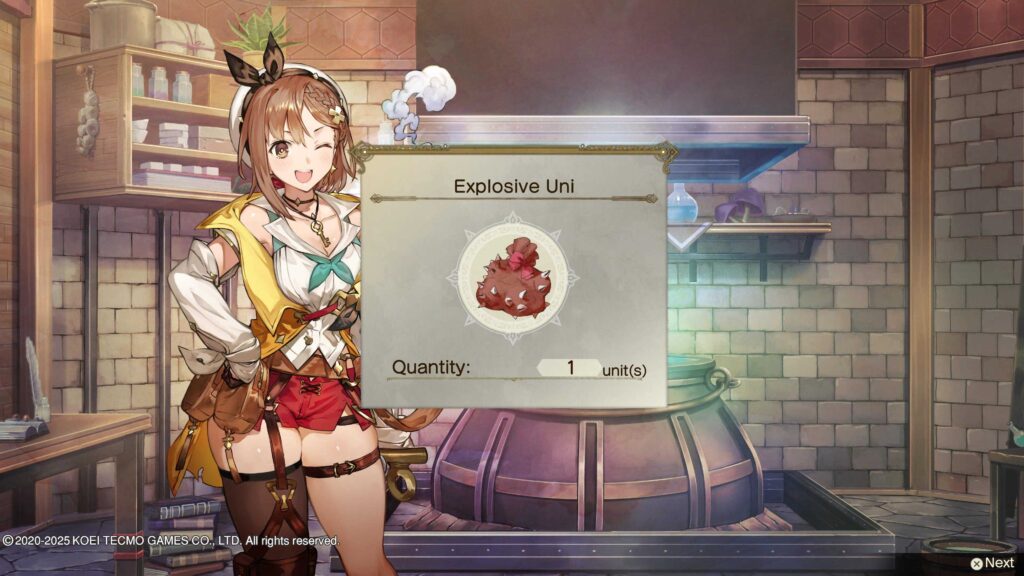
The one issue, Ryza needs to comment on everything. While crafting, for instance, adding a component, removing, changing a node, synthesizing… All of these elicit a comment from her. In the field you get much the same. The game only features Japanese audio, which should have been expected given the original was the same, but there is a reason Ryza got three games, and I feel English, similar to the Like A Dragon games now, would have been a far more noticeable addition in the west to help justify DX versions of games that aren’t relatively old, with the latest title in the series already being a PS5 game.
It’s when you get to exploration that you actually see the evolution of the three games in full. The first game struggles with invisible walls, or at least barriers that make traversal much less of an experience than the later ones, not to mention the loading screens. The second game changes where the action is set, ditching the rustic setting of Kurken Island of the first and third, so it’s hard to fully compare them, but with the introduction of far more open areas, compared to the already open areas of the first game, it is hard to argue that the game is built upon the successes of the previous title, narrowing in on what worked and simply giving you more of it.
By the third game, which should feel like a retread as it returns to the location of one, the loading screens are almost completely ditched, allowing for full traversal from one side of the map to the other seamlessly, and committing its new area to feel almost completely open world rather than being instanced by long hallways between open fields, adding so much to traversal that the follow up, Atelier Yumia, would continue using to great effect. Also you can right on a dolphin.
Wasn’t sure where to fit that in, but yeah, that’s a thing. Not to mention the music, which isn’t so much groundbreaking but evokes feelings of nostalgia, with Atelier Ryza at times feeling like a throwback experience, with melodies genuinely sounding like I remember games from my childhood sounding. Maybe not Lunar 2, but definitely Grandia 2. It has a whimsical yet gentle quality to it that fits Ryza and her journey perfectly. Since the game features a lot of slow moments, like mixing up some alchemy or wandering the town, handling problems along the way, it envelops you in the country life you will grow accustomed to.
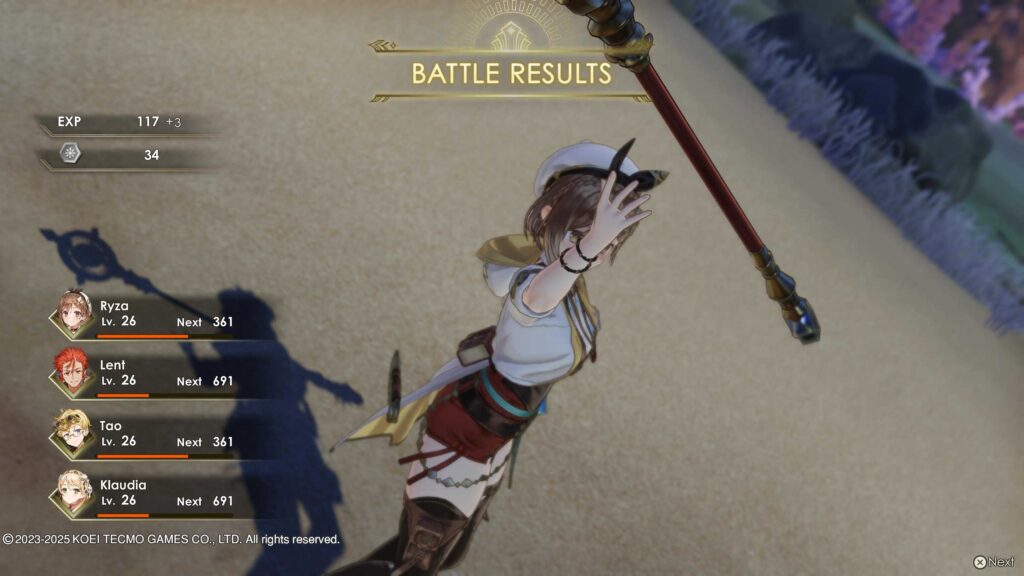
Atelier Ryza games are, for all intents and purposes, turn-based games. Ryza and her group get into combat with monsters, line up in a row, and then fight. It is, however, also so much more. While characters have a delay, combat itself is fast-paced, with combo strikes that can be mixed with powerful finishing moves to tear through enemies. Damage is actually pretty low against enemies the same level as you, so there is a heavy emphasis on your gear, and there can be a bit of a learning curve.
Like everything else, Ryza equips her party with alchemy, and despite only having base weapon and armor choices early on, crafting the same staff six times can each time make you slightly more powerful, despite this not being clear, meaning players might make the mistake of not engaging with the practice, which keeps combat slightly skewed against you. This progresses deeper with a guard that can be highly effective if triggered at the right moment, added for Ryza 2. The final game in the trilogy takes this even further with its titular keys that unleash devastating attacks. The core combo loop consistently feels more satisfying with each game, and never grows boring
Adding to this are tactics levels that alter the most between games, but consistently add elements like extra combo attacks or boosts in DPS as they grow, making longer fights actually more enjoyable than ones that end in a few hits. The core mechanic, though, could have used a slight overhaul, especially in the first game. The second and third allow it to recharge, but the OG has a system where you sacrifice combat items you have equipped to regain charges, but those charges are for the single run you anyway, which is just weird. While the first game takes an unbelievably long time to unlock the map, which could have also been improved with a minimap overhaul, Ryza has the ability to return to her room at any point, which resets it. I get that you can make more items, and as you progress, the quality of ingredients improves to make them better, but it feels odd to sacrifice them when you can just reset. You are capped at a number of uses that just isy, but the game never claimed to be built for long outings; your basket caps you as well.
This is kinda combined with the fact that all items for combat that require core charges need to be equipped back at your hideout anyway, which feels limiting. There are some elements to the menu of the game that aren’t bad but feel like, ‘if we are going to do this, let’s really do this, ‘ and that is chief among them. Equipping items never feels like such an egregious shift that it would break the game if I could do them anywhere, though obviously, this is a minor inconvenience in the grand scheme of the experience. On the bright side, the DX versions feature every DLC outfit released for all three games, which are accessed in the hideout, as well as the new custom battle mode, so there are more reasons than just crafting to return and decompress from all that adventuring.
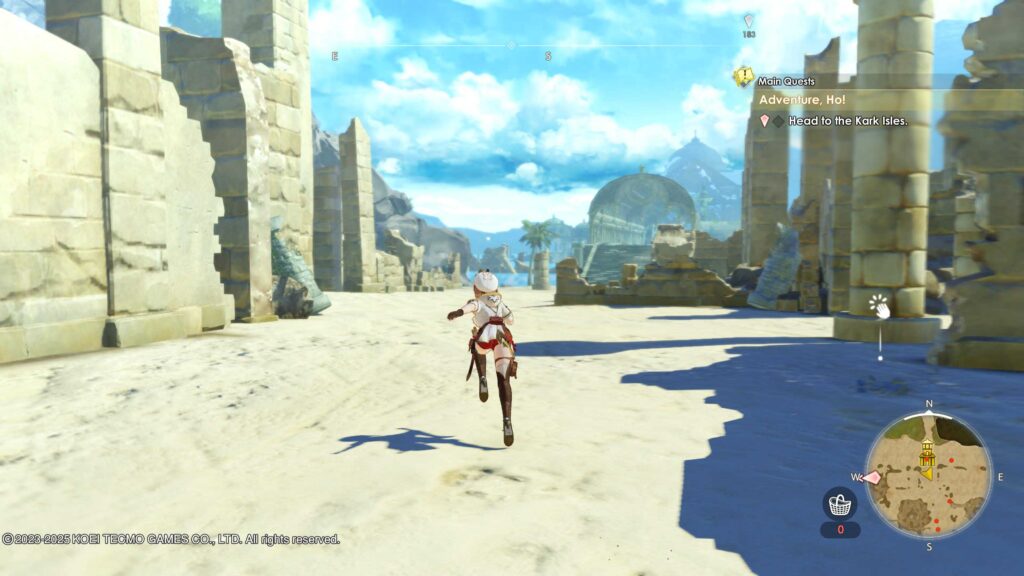
Verdict
Atelier Ryza DX Trilogy could come off as dated for its time, especially when compared to other Japanese franchises in the genre. Coming into the trilogy, it was still finding its own footing, and the popularity the series absolutely deserved. More importantly, though, Ryza is just fun. It has a great combat system mixed with the best version of alchemy that the series has seen both before and after. Ryza and her journey managed to be so compelling that they had to make three games just to tell it all, and there is never going to be a point where that experience isn’t worth being a part of.
Laughing along with the goofy jokes, letting the emotions hit you, or just going with the flow, and letting the loop consume you. Atelier Ryza is a masterclass that bucks the mold and tradition, doing it all with style. Six years later, I still find myself recommending Atelier Ryza to everyone I know, but now I get to recommend all three games at once in their best and final form!
Remember to follow us on Twitter, Facebook, and Bluesky to keep up to date on everything we have going on!
Reviewed on PlayStation 5, also available for PlayStation 4, Nintendo Switch, Nintendo Switch 2, and PC
A review code for this game was provided by Koei Tecmo for the purposes of this Review.
Developer: Gust
Publisher: Koei Tecmo
Release Date: November 13, 2025
Pros
+Great narrative that are complete in each act, with three acts to play here.
+An enjoyable synthesis mechanic that grows as you progress
+Great world to explore that opens up more in each game
+incredibly fun blend of turn based and real time combat
Cons
- Slow opening taking a while to get to better content
- Could have benefited for more audio options
-
Atelier Ryza DX Trilogy